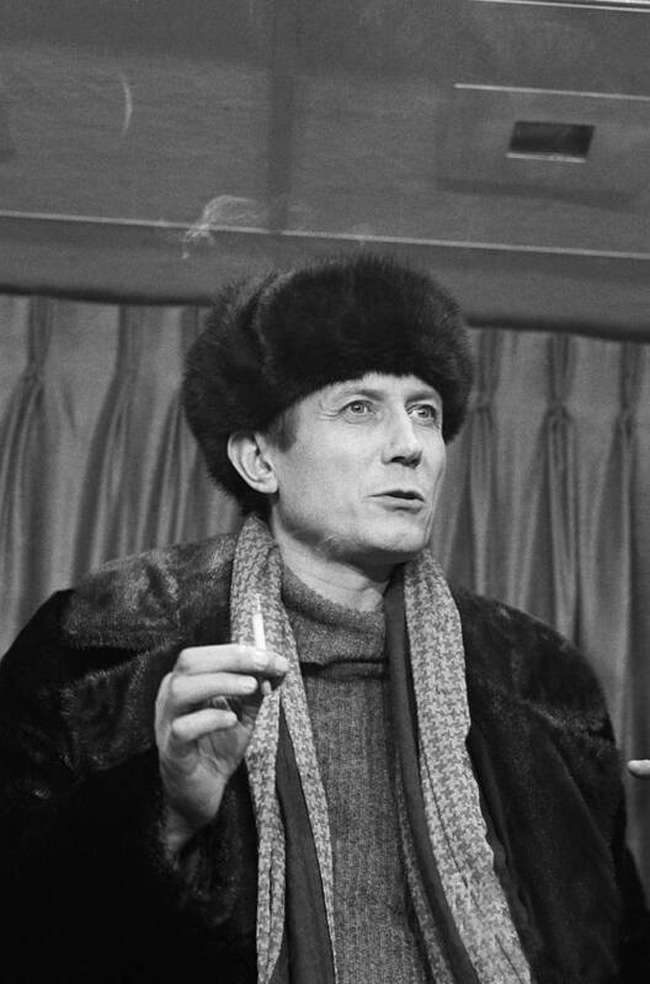by Evelyn Hooven (August 2024)

A Saturday afternoon, chilly but fair. Better get to the two o’clock reading early. The video I saw showed that in his native Russia large crowds gathered, even beyond standing room, for Yevtushenko’s poetry.
Here in Danbury, Barnes and Noble’s largest reading room seemed nearly empty—twelve or fifteen of us in what felt like a vast space. We moved automatically towards the podium in front.
With minutes to spare, the door opened. Only a very few last-minute arrivals. At the appointed time, he re-entered, stood at the podium and began to say his poems—Russian, followed by English. Mostly he seemed to know his poems and many translations by heart. For the very famous one, his voice rose, intensified—Babi yar, Remembering the 1941 Massacre by Nazis of Jews in Kiev.
Soon it was over; we applauded. He paused for questions. None. Then he left, closing the heavy door almost too quietly.
We were strangers not quite ready to leave. We began to talk.
He’ll never return.
He might if he needs money.
Not to Danbury.
Shouldn’t the college have done something?
Do they have Russian studies?
He’s known for preferring the general reader who likes poetry.
Is that us?
What did you think of the reading?
When it came to Babi-yar
I didn’t believe all that hype—
Russia—exculpating, self-inflating
Would saying nothing oh so honestly be better?
Saying nothing can mean oblivion.
Isn’t remembrance worth something?
It should be clearer just who is being remembered.
Russians are let off the hook too easy.
Antisemites are thugs, not true Russians.
True Russians are—how did he put it? —international to the core.
And kind.
He ends with, I haven’t a drop of Jewish blood in me, but I’m hated like a Jew because I’m a true Russian.
And I’m Dreyfus, the prophet Jesus, Anne Frank.
Neat trick.
He goes too far with credentials, but I still think it’s better than nothing.
I’m thinking that I am Anne Frank is misleading because the fact of separateness permits memorial—literally because your own life’s not threatened.
You’re allowed to stand apart in safety.
To see and feel the dangers and savagery.
You’ve been spared.
Maybe it’s a matter of proportions: The innocent, blameless victims need to loom larger than whether or not complicit Russians are being their true selves.
Did Russian’s pogrom history make it a natural choice for Nazi assault?
(A silence.)
We can’t bring back the dead.
We can’t make laws.
Still, this poet’s task is a hard one: try to turn the country where mass slaughter was permitted and memorial refused into a realm of lamentation if only for a moment.
More than a moment. Isn’t a work of art supposed to be durable?
I can’t shake the feeling that he’s cheering up the populace, glorifying himself—he is every old man killed and each child.
Maybe it takes a certain vanity to compose an elegy.
Does it help? Does it stop the next massacre?
It’s not mandate, it’s ceremony.
You fill our thoughts, you who are absent and should not be.
I forgot, was so focused on words: There’s a symphony by Shostakovich, his 12th, I think, that connects with Babi yar—the event and the poem also.
I was one of the last to leave. Something began to happen in that room that wasn’t over. Maybe the music…
Table of Contents
Evelyn Hooven graduated from Mount Holyoke College and received her M.A. from Yale University, where she also studied at The Yale School of Drama. A member of the Dramatists’ Guild, she has had presentations of her verse dramas at several theatrical venues, including The Maxwell Anderson Playwrights Series in Greenwich, CT (after a state-wide competition) and The Poet’s Theatre in Cambridge, MA (result of a national competition). Her poems and translations from the French and Spanish have appeared in Parnassus: Poetry in Review, ART TIMES, Chelsea, The Literary Review, THE SHOp: A Magazine of Poetry (in Ireland), The Tribeca Poetry Review, Vallum (in Montreal), and other journals, and her literary criticism in Oxford University’s Essays in Criticism.
Follow NER on Twitter @NERIconoclast
- Like
- Digg
- Tumblr
- VKontakte
- Buffer
- Love This
- Odnoklassniki
- Meneame
- Blogger
- Amazon
- Yahoo Mail
- Gmail
- AOL
- Newsvine
- HackerNews
- Evernote
- MySpace
- Mail.ru
- Viadeo
- Line
- Comments
- SMS
- Viber
- Telegram
- Subscribe
- Facebook Messenger
- Kakao
- LiveJournal
- Yammer
- Edgar
- Fintel
- Mix
- Instapaper
- Copy Link








One Response
No Russian poem translates well into English. The alexandrine simply doesn’t work in englsih.